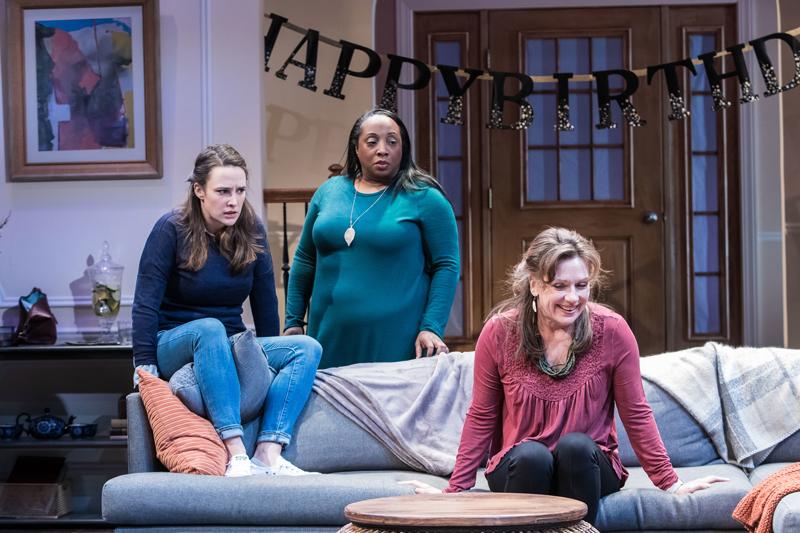Cary Crim’s latest Purple Rose premiere, Never Not Once, is one of those plays that uses its absolutist title to signal unshakeable moral truths, in spite of the moral chaos and ambiguity in which we live. This is a lofty goal for a ninety-minute show and one that could very easily slide into trite sentimentalism. That it doesn’t is a testament to a solid script and some truly excellent performances.
The set-up is simple enough: it’s a normal day for a practically-perfect-in-every-way interracial lesbian couple. Allison (Michelle Mountain) is a Diane Keaton-esque artsy type; Nadine (Casaundra Freeman) is a down-to-earth NASA engineer who indulges her partner’s scattered-yet-winsome ways. Their nighttime rituals of teeth brushing and deciding how to dispose of bathroom bug invaders is interrupted when their college-age daughter Eleanor (Caitlin Cavannaugh) breezes into their tastefully minimalist home, boyfriend in tow, announcing her intention to look for her biological father.
Her innocent declaration shatters the facade of domestic bliss. Allison insists that the ho-hum one-night stand in college that resulted in Eleanor’s birth was so unmemorable that she doesn’t even remember the guy’s name. But Nadine gives Eleanor a name—Doug—that Allison uttered once in her sleep. Eleanor manages to locate Doug (Rusty Mewha), leading her family and the audience into an emotionally draining ethical minefield.
The encounter between Allison and Doug was nonconsensual—they were drunk at a frat party—and they, along with Eleanor, have to struggle with what this moment of casual violence has made them. Cavannaugh does an excellent job playing Eleanor’s anguished horror as an innocent quest for her roots turns into a waking nightmare, and Mountain gives a riveting performance, playing Allison as swinging somewhat unpredictably between icy fury and an almost Zen-like acceptance. Mewha’s Doug, a recovering alcoholic who’s just gotten his life together, is a bewildered guy who believes that he’s good, albeit with a few flaws.
It is an excellently acted, gripping, timely drama. It is also a profoundly moving, yet deeply unsatisfying, show for those who, like me, demand accountability. The play forces us to grapple with several tough questions about consent, forgiveness, and the nature of justice, but then ultimately tries for a satisfying resolution. That speaks to the understandable desire for closure, but in repeatedly offering redemption to a man who has trouble admitting what happened, the play refuses to address the biggest and most important question of all: Is the act of offering redemption enough for the Allisons of the world?
Never Not Once runs through March 16.
